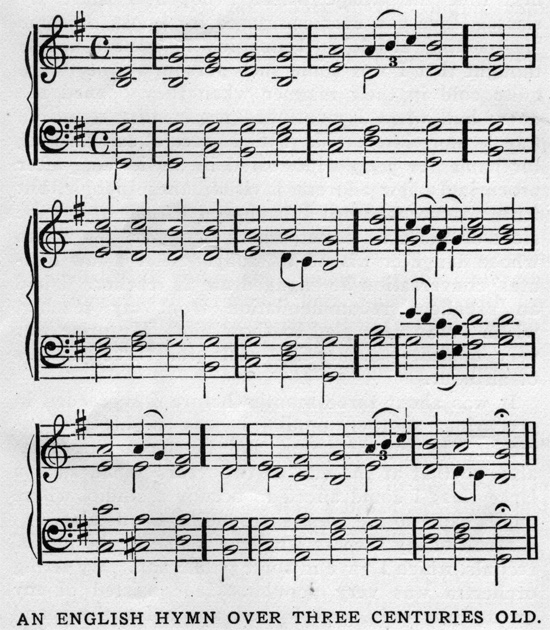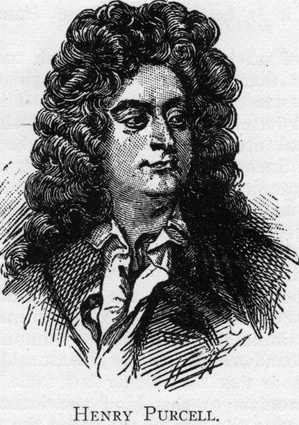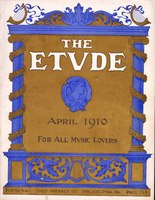By JAMES FRANCIS COOKE
(From “The Young Folks’ Standard History of Music”)
[A few chapters suitable for periodical publication selected from the above mentioned work have appeared in past issues of The Etude. These are part of a series of forty “story-lessons” designed to assist private teachers or history classes in securing the interesting and vital facts in musical history in the most attractive and direct manner possible. Although the book is intended to be absolutely simple, the author has aimed to produce a work equally interesting to the adult and to the child.—Editor’s Note.]
After one has learned what had been done on the European continent during the first fifteen hundred years after the birth of Christ, our knowledge of history would be very incomplete if we did not study something of the works of the first composers of early England.
That music was known in early Ireland, Wales, Scotland and England there can be no doubt. The stories of the musical “bards” or poets are very many. In the fifth century in Ireland the most famous musician was the King O’Brien Boru, and the harp he is said to have owned, with twenty-eight strings, is to be seen in the Dublin Museum. We have learned that the credit for the first Polyphonic (many voiced) writing was given to John Dunstable, who was an Englishman. We have also learned that what is supposed to be the first example of Polyphonic writing was the old English canon “Sumer is icumen in.”
Thomas Tallis, was probably the most celebrated English musician after Dunstable. He was born in 1510, and died in 1585. He was organist at Waltham Abbey, and at the Chapel Royal. With his pupil, Byrd, he obtained a monopoly of the music publishing business in England. He left many remarkable choral works which won him the title of “The Father of English Choral Music.” One of his hymns known as “Tallis” is still to be found in our hymnals. The music of this hymn is:

William Byrd (born 1543 and died 1623). He was a pupil of Tallis, and became organist at Lincoln, and later, at the Chapel Royal. He wrote a great deal for the “virginal,” which was a keyboard instrument with strings like a piano, but with a different method of sounding the strings. Byrd also wrote many masses, motets, anthems, psalms, madrigals and songs and was thought by many in his own day to be equal to Palestrina and Di Lasso.
John Bull (born 1562 and died 1628) became organist of the Chapel Royal in 1597 and later became Professor of Music at Gresham College. He was very famous as a virtuoso and in 1617 became organist of the Cathedral in Antwerp. His polyphonic writing was considered excellent and wrote many pieces for instruments with keyboards. The melody of “God Save the King” (sung in America to the word of “My Country, ‘Tis of Thee”) was for many years attributed to Dr. Bull.
 Without question, however, the most famous composer in early England was Henry Purcell who died in 1695 at the age of 37. His family was musical and he was left an orphan and entered the Chapel Royal as a choir boy, serving under the famous organists Cooke, Humphrey and Blow. In 1675 he set music to a play by Tate which met with such immediate success that he continued to write other songs and music for plays with great rapidity. He wrote music for over forty plays and operas for which the leading poets of his day furnished the words. In 1680 he became organist at Westminster Abbey and two years later at the Chapel Royal. This turned his attention to composition for the church and he wrote over one hundred anthems, three services and numerous songs, etc. His music was very original and for nearly two centuries his position as the greatest of all English musicians was not disputed by any.
Without question, however, the most famous composer in early England was Henry Purcell who died in 1695 at the age of 37. His family was musical and he was left an orphan and entered the Chapel Royal as a choir boy, serving under the famous organists Cooke, Humphrey and Blow. In 1675 he set music to a play by Tate which met with such immediate success that he continued to write other songs and music for plays with great rapidity. He wrote music for over forty plays and operas for which the leading poets of his day furnished the words. In 1680 he became organist at Westminster Abbey and two years later at the Chapel Royal. This turned his attention to composition for the church and he wrote over one hundred anthems, three services and numerous songs, etc. His music was very original and for nearly two centuries his position as the greatest of all English musicians was not disputed by any.
Among other early English musicians whose works have won enduring fame for them are Henry Lawes (1595-1662) who wrote the music to Milton’s “Comus” and who was a great friend to the immortal epic poet. Thomas Augustine Arne (1710-1778) was the composer of “Rule Britannia” and some of the most vigorous as well as the most graceful English songs. He was a Doctor of Music of Oxford and wrote two oratorios, several operas and the music to some of the Shakespeare plays.



